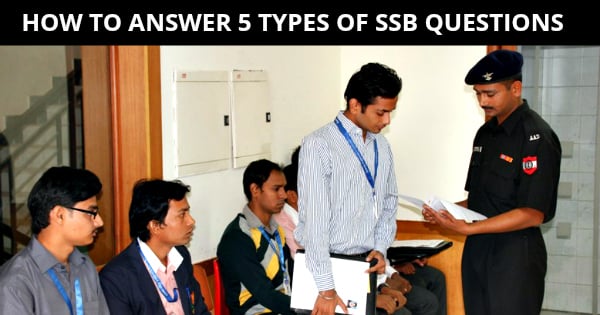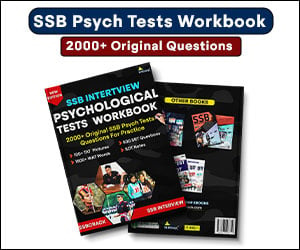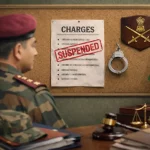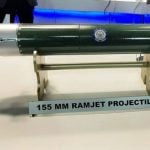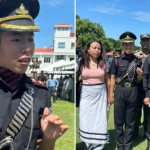It’s important to be prepared to respond effectively to the SSB interview questions that IO typically ask at the one-on-one interview. Since these questions are so common, IO will expect you to be able to answer them smoothly and without hesitation. He reads well the PIQ filled by the candidate on the first day and also have the psychological test paper i.e. self-description and comments of the psychologist over the candidate, in his hand before the candidate is called inside the interview room.
Thus the IO just cross checks the candidate by triggering some basic question and also putting forward the series of questions at a stretch that is called as Rapid Fire Questions. With these replies, he notes down the response and checks the candidate whether he is truthful with his answers and remarks on the OLQs of the candidate.
You don’t need to memorize an answer, but do think about what you’re going to say so you’re not put on the spot during the interview. Your responses will be stronger if you prepare in advance, know what to expect during the interview, and have a sense of what you want to play up during your interview.
Examine the 5 types of questions you will most likely be asked at the interview.
1. Introduction questions or Feel Free Questions or Calm Down Questions.
2. Usual Questions.
3. Social problem or Candidate Solution type questions.
4. Technical questions or Application Knowledge questions.
5. Armed Forces questions.
We shall discuss details about these type of questions and ways to approach to them.
1. Introduction questions or Feel Free Questions or Calm Down Questions:
Usually, these types of questions are put to the candidates after their entry into the interview panel. The IO asks some basic questions which can be easily answered by the candidate so that he/she feels at ease with the IO.
The questions can be:
1. Which place are you coming from and say something about that place?
2. Tell something about your name and why named so?
3. Tell five things about your native and which you like most?
How to answer?
For the first question, the answer should not be like… Sir, I am from Chennai.
But the answer should be like…Sir, I am from Chennai, a Northen district and coastal city of Tamilnadu which is also the capital of Tamil Nadu. The population is about ………… and the main occupations of
people are……… The specialty is ……….. and tourism is………. and the special things are OTA etc.
Answers like this cover all details at once and give a broad approach to your answer and show your knowledge about the place.
** The answer given to the IO should be crystal clear and optimistic. These are Introduction questions and easy to answer and play vital roles in recording your personality traits.
2. Usual Questions:
The Usual questions part carry two types of questions.
# Rapid Fire Questions
# Stress Interview
This part plays a major role in the interview and occupies most of the time of the interview.
For example: Why you want to join the Indian Army/Navy/Air Force?
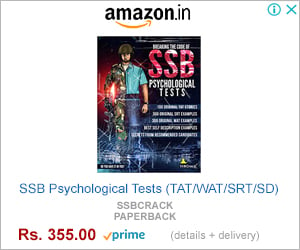
# What is Stress Interview?
The stress interview gives the original personality of the candidate. Since normally it is easy to
answer all the questions without losing temper if we have good communication skills and confidence. But answering in the time of stress is the real success and the candidate with all OLQs will cross this barrier easily.
The IO cross-checks the candidate that whether under stressful situations, he/she loses his/her originality and keeps his/her position with good decision making and solution finding abilities or not.
After finishing the Introduction Questions, he tests the candidate for stress interview.
During this, he will ask more and more twisted questions on the same area with greater thrust until the candidate loses temper or exposes all knowledge and awareness on it.
For example: What is the difference in the brake system of train and car. If you explain about
hydraulic and electrical brake system, he will cross-examine about both the brake system such as what type of liquid and oil is used, etc. If you answer correctly, he triggers as to why such liquid and not the other. He continues and tries to break the ground of the candidate. In these kinds of situations, you have to keep smiling and answer the questions by showing your knowledge without fooling around. If you don’t know the answer, just say….Sorry Sir, I don’t know but will find it out.
He may ask you questions from other backgrounds/streams which you don’t belong to. The idea is not to intimidate you but to record your reactions under stress.
Now comes the important complication of the Personal Interview:
# Rapid Fire Questions
The Rapid Fire Questions are a set of questions which are asked at a stretch, nearly ten to
fifteen number of questions will be triggered out by the IO; to check the observation qualities of the candidate and how well he/she answers with honesty.
The Rapid Fire questions range from the educational background, family background, views from your parents, teachers, friends about you and your view of them to hobbies and interests, sports, etc. He may check your leadership qualities by asking about your extracurricular activities and how would you organize a task or event related to it.
The Rapid Fire Questions are from the PIQ only. So just prepare a PIQ of yourself, form the answers and check for the OLQs from it. And practice communicating.
Questions raised from the PIQ for the Rapid Fire can be of/from:
# Educational Background
# Family Background
# Friends
# Hobbies and interests
# Sports and Games
# Workplace/ Job
How to answer?
When you sit to analyze and write about your complete particulars for the PIQ and the Personal Interview, the very first thing that you must do is SWOT ANALYSIS, as we discussed before in the blog Tough Questions Asked In SSBs.
Take time and write down about your strengths and weaknesses and pros & cons. Analyze, ask questions to self, research about your personality and qualities, about every possible thing. Remember you can’t transform yourself in a day. It requires time and patience. Be honest with yourself and your answers.
As you wrote in your self-description about what your parents, teachers, and friends think about you, your own opinions of self and goals; just be impartial with your responses in the personal interview also because the IO cross-checks your answers.
You require vast knowledge about your hobbies because a candidate with a good attitude will have information about his/her hobbies. Hobbies can vary from music, singing, blogging, reading, philately, photography, trekking etc. Create questions based on your hobby and make responses for that to get thorough knowledge over it.
Also, gather information about your interests. Questions like What type of news channel, TV shows you see and which periodical you read and why?
I believe if you are really keen and enthusiastic towards your hobbies and interests then your this inclination would definitely reflect in your field’s knowledge and you don’t actually have to collect information just for the sake of the interview!!
Every young individual should play a game in his/her spare time. If you don’t have a game to play just join any club of your interests and start playing as it helps you to acquire more OLQs.
Leadership and organizing ability is the important quality of every officer. So this part of the
interview seems to be important. The IO may give a situation to check your organizing ability and
ask questions from the PIQ in the fields of extracurriculars such as N.S.S and N.C.C. (According to your answers) etc.
For example: If you are going for an Industrial Visit to a nearby Industry. Suddenly your Coordinator calls and says he met with an accident on his way, how will you arrange the tour and make it a successful one.??
Candidates need to keep their ears and eyes wide open so that they can listen to the situation carefully and respond accordingly. Your immediate action should reflect leadership qualities and instant presence of mind.
The immediate call of situation can be like… You shoulder the responsibility willingly and gather your teammates and give them full details of the tour, assign them tasks if required, visit the industry, record important information, come back in time successfully.
3. Social problem or Candidate Solution type questions:
In this part, the IO asks questions relating to world issues, national issues, and solutions for those issues. Also, he examines the depth of your knowledge and approach to those issues.
For example: He asks your views on Cross-Border Terrorism, Human Trafficking, Demonetisation, etc.
Current Affairs and General Knowlege and issues: He may ask history and current affairs of the nation and world.
Not necessary that you know everything but don’t panic.
4. Technical questions or Application Knowledge questions:
If you attend SSBs for the TGC entry, SSW TECH, Flying Branch, Observer, etc. the IO puts forward some basic technical questions from your stream and their applications in your day to day life. For example: If you say that you play cricket, he may ask how will you apply physics law to the swing bowling. If you are from engineering background the questions like
#Basic Network questions
#Basic physics laws
#Engineering fundamentals, etc can be asked.
The IO asks questions pertaining to the candidate’s Graduation/Post Graduation subjects to test subject knowledge and observes your application knowledge. i.e. application of your theoretical knowledge in the physical day to day tasks that can be accessed in the Armed Forces.
5. Armed Forces questions:
It is absolutely imperative to know and have good knowledge about the organization you want to join. Update yourself with all current news and history of the Indian Armed Forces.
There is no shortcut to SSB. You will be grilled as per the scrutiny process. Just be natural and keep your cool!!

